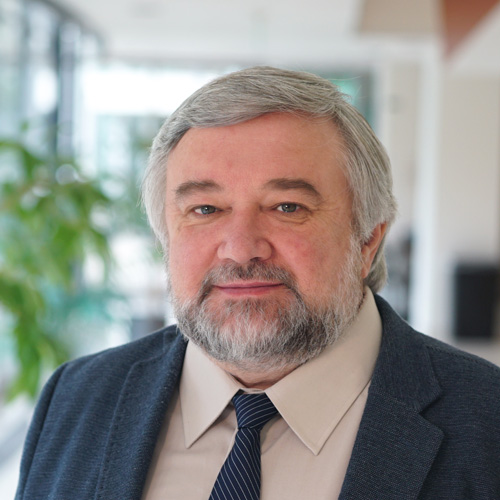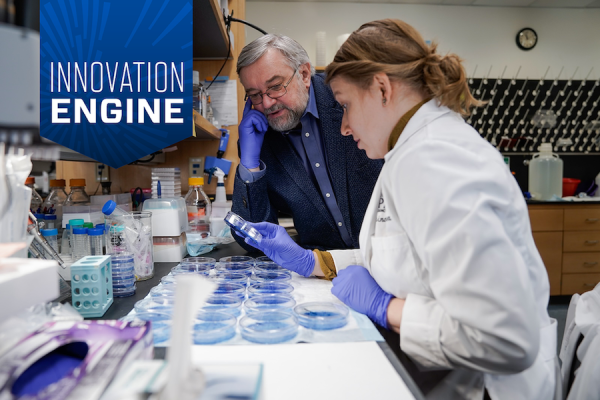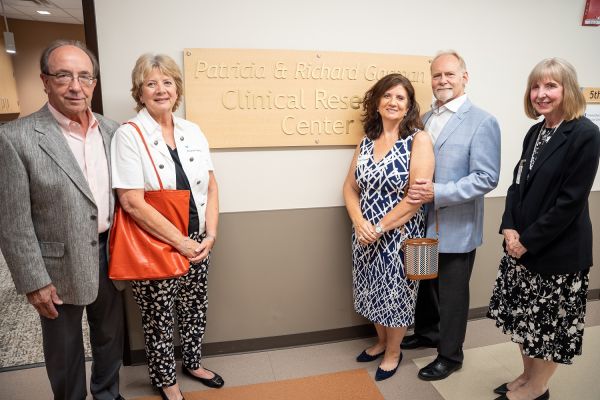Research Interests:
- Cell stress signaling pathways in cancer and aging
- Novel anticancer and antiaging targets and drugs
Biography
Andrei V. Gudkov, PhD, DSci, is Professor of Oncology, Senior Vice President, Research Technology and Innovation, and Chair of the Department of Cell Stress Biology. He has been a member of the senior leadership team for the National Cancer Institute (NCI) Cancer Center Support Grant at Roswell Park Comprehensive Cancer Center since 2007. He is responsible for advancing the basic and translational research strengths of the Cell Stress Biology Program in studying genotoxic, metabolic and thermal stresses, mechanisms of inflammation and development of innovative anticancer approaches, including photodynamic therapy. As Senior Vice President, he assists the President & CEO in developing and implementing strategic plans for new scientific and technology development programs and enhances collaborations in research and development programs with regional and national academic centers and industry.
Before joining Roswell Park, Dr. Gudkov served as Chair of the Department of Molecular Genetics at Lerner Research Institute, Cleveland Clinic Foundation, and Professor of Biochemistry at Case Western Reserve University. He has authored or co-authored more than 230 scientific articles and holds more than 50 patents.
Positions
Roswell Park Comprehensive Cancer Center
- Senior Vice President, Research Technology and Innovation
- Chair – Department of Cell Stress Biology
- The Garman Family Chair in Cell Stress Biology
Background
Education and Training
- PhD - Experimental Oncology, Cancer Research Center, USSR
- DSci - Molecular Biology, Moscow State University, USSR
Research Overview
Dr. Gudkov’s laboratory is conducting a broad research program involving several distinct but highly integrated branches of study. These include studying stress response pathways, such as p53 and NF-kB, intrinsic mechanisms of DNA damage and control of genomic instability associated with activity of endogenous retrotransposons, and the role of inflammation in cancer development and progression. Stress associated with cancer treatment is a major direction of his research that involves developing therapies aimed at reducing side effects of radiation and chemotherapy and improving the quality of life of cancer survivors. This line of research is closely connected with studying mechanisms that control longevity and aging, the major current focus of the lab. A series of novel anticancer and antiaging agents have been developed in collaboration with biotech companies that were spun off Gudkov’s lab to focus on the development of these drug candidates that are at different stages of preclinical and clinical development.
Understanding and counteracting cancer treatment side effects
Advances in cancer therapies result in a rapidly growing number of cancer survivors, whose quality post-cancer health has become an increasingly significant medical problem. In fact, even successful cancer treatment is frequently associated with the acquisition of side effects affecting their quality of life and longevity. Dr. Gudkov’s lab pioneered understanding mechanisms behind major cancer treatment side effects and developing approaches to prevent and treat them. Tumor suppressor p53 was identified as a mediator of excessive suicidal cell death following radiation and chemotherapy, and suppression of p53 pro-apoptotic function as a method of preventing such side effects. His works published in Nature, Science and other top-level journals opened a new area in the p53 field: pathologies associated with p53 activity.
To counteract damage to healthy tissues during cancer treatment, Dr. Gudkov’s team developed several pharmacological agents and demonstrated their efficacy in animal models of diseases mimicking cancer treatment side effects in humans. The most advanced among them is an NF-kB activating molecule, an agonist of innate immunity receptor TLR5 named entolimod, has been developed that demonstrated exceptional tissue-protective activities from radiation, chemotherapy and other DNA damaging stresses. Entolimod is a clinical-stage drug candidate developed for multiple indications, including treatment of lethal acute radiation syndrome caused by nuclear disasters. Entolimod also possesses the activity of anticancer and antiaging immunotherapeutic. Dr. Gudkov’s laboratory continues studies aimed at developing new generations of TLR5 agonists (e.g., GP532, a deimmunized version of entolimod) and broadening their therapeutic indications via better understanding mechanisms of their activity.
Novel anticancer target and drug discovery
Dr. Gudkov pioneered new target and drug discovery approaches. He developed several functional genomic methodologies that are based on the use of libraries of gene repressors. These include Genetic Suppressor Element (GSE; developed in collaboration with Igor Roninson) and Selection-Subtraction Approach (SSA) – the techniques, which were successfully applied to identify new genes encoding potential tumor suppressors and other disease-associated genes and deciphering molecular mechanisms of activity of their products as potential targets for therapeutic modulation by small molecules or peptides. The discovery of the cancer association of ING family of genes is one of the hallmarks of the success of this effort.
Gudkov lab was among the first who utilized the power of small molecule library screening for drug discovery. Starting from the discovery of new p53 inhibitors and testing their potential therapeutic applications for reducing cancer treatment side effects and possibly other pathologies involving p53-inducing stresses, he then successfully used chemical libraries to screen for bioactive small molecules for potential anticancer, tissue-protective and antiviral use (e.g., p53 inhibitors Pifithrins and, a suppressor of tumor multidrug resistance mechanism Reversan, p53 activator in HPV-driven tumors Retra, etc.). Several of them, after hit-to-lead optimization, have reached clinical stage and are currently undergoing clinical trials. These include multitargeted non-covalent DNA binder and chromatin modifier Curaxin, and inhibitor of nicotinamide phosphoribosyl transferase (NAMPT) OT-82. Curaxin has opened a new class of chromatin-targeting drugs and a new direction in cancer epigenetics being successfully developed by Dr. Katerina Gurova. OT-82 is a novel NAMPT inhibitor that showed exceptional efficacy in preclinical models of hematologic malignancies. Both are currently undergoing clinical testing.
Another anticancer drug candidate developed in Gudkov lab, Mobilan, stemmed from exploring the immunotherapeutic properties of TLR5 agonists. This recombinant adenovirus for intratumor injections induces simultaneous expression of TLR5 receptor and agonist (modified entolimod) in tumor cells thus enabling antitumor vaccination. It has successfully passed through Phase I clinical trial in prostate cancer patients.
Antiaging research
Most recent direction of Dr. Gudkov’s research is aimed at understanding mechanisms of mammalian aging and developing therapies for prevention and treatment of aging-associated frailty and other pathologies, including cancer. He is following highly original research path that connects aging with gradual accumulation in healthy tissues of pathogenic somatic cells with DNA damaged by the activity of ‘retrobiome’ – a large family of highly repetitive virus-like genetic elements replicating via mechanism of reverse transcription and named retrotransposons or retroelements. Gudkov lab pioneered demonstration of retrobiome silencing control by p53 and activation of interferon as a response to stress associated with its desilencing. This phenomenon, named TRAIN (for Transcription of Repeats Activates Interferon), is a new major tumor suppressor mechanism that highlighted major role of retrobiome activation in cancer and aging. TRAIN concept opened several prophylactic therapeutic opportunities that are based on pharmacological suppression of retrobiome expansion (using small molecule inhibitors of enzymatic activities of reverse transcriptase of LINE-1 retrotransposons) and immunotherapeutic eradication of cells with activated retrobiome. Both these directions are being explored by Gudkov’s lab within an antiaging Quality of Life and Longevity program, that includes, besides drug discovery, also new diagnostic methodologies and development of a solid bioinformatic platform for retrobiome analysis.
Another aspect of Gudkov’s antiaging platform involves reverting of immunosenescence – a general functional decline of immunity observed in elderly. Here he is using a strong immunostimulatory power of TLR5 agonists, initially developed as radiation antidotes, that are now being tested as agents capable of restoration of vaccination capabilities in geriatric population. This hypothesis is being tested in a clinical study of entolimod in geriatric population undergoing anti-flu vaccination. This Phase II clinical trial currently ongoing at Mayo Clinic under the leadership of clinical gerontology experts Drs. Robert Pignolo and James Kirkland.
Academic and biotechnology collaborators:
New disease treatment concepts and bioactive molecules with therapeutic potential were discovered in Gudkov’s lab involved collaborations with multiple national and foreign academic institutions and industrial entities including several biotech startups that were spun out of Dr. Gudkov’s lab. Dr. Gudkov also founded a non-for-profit biomedical research entity, Vaika, Inc. (https://www.vaika.org/), that conducts clinical research in collaboration with Cornell University School of Veterinary and is aimed at understanding and extending healthspan and lifespan of domestic dogs. All companies established by Dr. Gudkov have been operating in close research collaboration with Roswell Park based on joint grants and contracts ongoing under Dr. Gudkov’s coordination and supervision. Dr. Gudkov’s collaborators include:
- Michelle Haber, Ph.D. & Murray Norris, Ph.D. (Children's Cancer Institute of Australia, Sydney)
- Leonid Brodsky, PhD (Tauber Center for Bioinformatics, University of Haifa, Israel)
- Ekaterina Andrianova & Ilya Gitlin, PhD (Flag Bio, Inc., Buffalo, NY)
- Robert Pignolo, MD, PhD, James Kirkland, MD, PhD & Tamara Tchkonia (Mayo Clinic, Rochester, MN)
- Vera Gorbunova, PhD & Andrei Seluanov, PhD (University of Rochester, Rochester, MN)
- Peter Fedichev, PhD (GERO, Singapore)
- Albert Pinhasov, MD, PhD (Ariel University, Israel)
- Andrei Osterman, PhD (Sanford Burnham Prebys Medical Discovery Institute, La Jolla, CA)
- Mikhail Nikiforov, Ph.D. (Wake Forest Comprehensive Cancer Center)
- Natalia Isaeva, PhD (University of North Carolina)
- Denis Logunov, PhD, DSci and Boris Naroditsky, PhD, DSci (Gamaleya Institute of Microbiology, Russia)
- Marianna Yakubovskaya, PhD, DSci (N.N. Blokhin National Cancer Center, Moscow, Russia)
- Katerina Leonova, PhD, Craig Brackett, PhD, PhD, Joseph Skitzki, MD, Katerina Gurova, MD, PhD, Scott Abrams, PhD, Aimee Stablewski, PhD, Grace Dy, MD, PhD, Christine Ambrosone, PhD, Carl Morrison, MD, DVM, Anurag Singh, MD, Elizabeth Repasky, PhD (Roswell Park Comprehensive Cancer Center)
Featured on CancerTalk
Publications
- Demidenko ZN, Korotchkina LG, Gudkov AV, Blagosklonny MV. Paradoxical suppression of cellular senescence by p53. Proceedings of the National Academy of Sciences of the United States of America 2010; 107(21):9660-9664
- Kelly RM, Hollander GA, Gudkov AV, Komarova EA, Scott HS, Osborn MJ, Stefanski HE, Mueller SN, Taylor PA, Goren EM, Blazar BR. Short-term inhibition of p53 combined with keratinocyte growth factor improves thymic epithelial cell recovery and enhances T-cell reconstitution after murine bone marrow transplantation. Blood 2010; 115(5):1088-1097
- Leonova KI, Shneyder J, Antoch MP, Toshkov IA, Novototskaya LR, Komarov PG, Komarova EA, Gudkov AV. A small molecule inhibitor of p53 stimulates amplification of hematopoietic stem cells but does not promote tumor development in mice. Cell cycle (Georgetown, Tex.) 2010; 9(7):1434-1443
- Lu T, Jackson MW, Wang B, Yang M, Chance MR, Miyagi M, Gudkov AV, Stark GR. Regulation of NF-kappaB by NSD1/FBXL11-dependent reversible lysine methylation of p65. Proceedings of the National Academy of Sciences of the United States of America 2010; 107(1):46-51
- Gasparian AV, Neznanov N, Jha S, Galkin O, Moran JJ, Gudkov AV, Gurova KV, Komar AA. Inhibition of encephalomyocarditis virus and poliovirus replication by quinacrine: implications for the design and discovery of novel antiviral drugs. Journal of virology 2010; 84(18):9390-9397
- Gudkov AV, Komarova EA. Pathologies associated with the p53 response.Cold Spring Harbor perspectives in biology 2010; 2(7):a001180
- Gudkov AV, Komarova EA. Radioprotection: smart games with death. Journal of clinical investigation 2010; 120(7):2270-2273
- Gurova K, Gudkov AV. Targeting transcriptional regulators for simultaneous modulation of p53 and NF-kappa B in cancer treatment. Proceedings of the American Association for Cancer Research Annual Meeting 2010; 51:1418
- Korotchkina LG, Leontieva OV, Bukreeva EI, Demidenko ZN, Gudkov AV, Blagosklonny MV. The choice between p53-induced senescence and quiescence is determined in part by the mTOR pathway. Aging 2010; 2(6):344-352
- Blagosklonny MV, Kenyon C, Kroemer G, Longo V, Nussenzweig A, Osiewacz HD, Peeper DS, Rando TA, Rudolph KL, Sassone-Corsi P, Serrano M, Sharpless NE, Skulachev VP, Tilly JL, Tower J, Verdin E, Karlseder J, Helfand SL, Hekimi S, Campisi J, Sinclair DA, Bartke A, Blasco MA, Bonner WM, Bohr VA, Brosh RM, Brunet A, DePinho RA, Donehower LA, Finch CE, Finkel T, Gorospe M, Gudkov AV, Hall MN, Vijg J. Impact papers on aging in 2009. Aging 2010; 2(3):111-121
- Leontieva OV , Gudkov AV , Blagosklonny MV. Weak p53 permits senescence during cell cycle arrest. Cell cycle (Georgetown, Tex.) 2010; 9(21):4323-4327
- Tukhvatulin AI , Logunov DY , Shcherbinin DN , Shmarov MM , Naroditsky BS ,Gudkov AV , Gintsburg AL. Toll-like receptors and their adapter molecules.Biochemistry (Moscow) 2010; 75(9):1098-1114
- Burkhart CA, Gudkov AV, Norris MD, Marshall GM, Sartorelli AC, Gurova KV, Komarov PG, Isachenko N, Purmal A, Smith J, Flemming C, Xue C, Prokvolit A, Pajic M, Murray J, Watt F, Haber M. Small-molecule multidrug resistance-associated protein 1 inhibitor reversan increases the therapeutic index of chemotherapy in mouse models of neuroblastoma. Cancer research 2009;69(16):6573-6580
- Guo C, Gasparian AV, Zhuang Z, Bosykh DA, Komar AA, Gudkov AV, Gurova KV. 9-Aminoacridine-based anticancer drugs target the PI3K/AKT/mTOR, NF-kappaB and p53 pathways. Oncogene 2009; 28(8):1151-1161
- Korotchkina LG, Demidenko ZN, Gudkov AV, Blagosklonny MV. Cellular quiescence caused by the Mdm2 inhibitor nutlin-3A. Cell cycle (Georgetown, Tex.) 2009; 8(22):3777-3781
- Logunov DY, Scheblyakov DV, Zubkova OV, Shmarov MM, Rakovskaya IV, Gintsburg AL, Gudkov AV, Naroditskii BS. Lipid-associated membrane lipopeptides of M. arginini activate NF-κB by interacting with TLR2/1, TLR2/6, and TLR2/CD14. Molecular genetics, microbiology and virology 2009;24(2):72-75
- Lu T, Jackson MW, Singhi AD, Kandel ES, Yang M, Zhang Y, Gudkov AV, Stark GR. Validation-based insertional mutagenesis identifies lysine demethylase FBXL11 as a negative regulator of NFkappaB. Proceedings of the National Academy of Sciences of the United States of America 2009;106(38):16339-16344
- Narizhneva NV, Tararova ND, Ryabokon P, Shyshynova I, Prokvolit A, Komarov PG, Purmal AA, Gudkov AV, Gurova KV. Small molecule screening reveals a transcription-independent pro-survival function of androgen receptor in castration-resistant prostate cancer. Cell cycle (Georgetown, Tex.) 2009;8(24):4155-4167
- Neznanov N, Fairchild RL, Almasan A, Banerjee AK, Gasparian AV, Gurova KV, Komarov AP, Neznanova L, Gorbachev AV, Gudkov AV. Anti-malaria drug blocks proteotoxic stress response: anti-cancer implications. Cell cycle (Georgetown, Tex.) 2009; 8(23):3960-3970
- Pospelova TV, Demidenko ZN, Bukreeva EI, Pospelov VA, Gudkov AV, Blagosklonny MV. Pseudo-DNA damage response in senescent cells. Cell cycle (Georgetown, Tex.) 2009; 8(24):4112-4118
- Neznanov N, Komarov AP, Neznanova L, Stanhope-Baker P, Gudkov AV. Proteotoxic stress targeted therapy (PSTT): induction of protein misfolding enhances the antitumor effect of the proteasome inhibitor bortezomib.Oncotarget 2011; 2(3):209-221
- Glybochko P, Gudkov A, Naroditsky B, Shmarov M, Logunov D, Vinarova N, Barykova Y, Fiev D, Vinarov AZ, Ginzburg A. Does the possible role of mycoplasma infection in prostate cancer pathogenesis exist? . European urology supplements 2011; 10(2):204
- Lee MH, Jothi M, Gudkov AV, Mal AK. Histone Methyltransferase KMT1A Restrains Entry of Alveolar Rhabdomyosarcoma Cells into a Myogenic Differentiated State. Cancer research 2011; 71(11):3921-3931
- Burdelya LG, Feinstein E, Didonato JA, Osterman AL, Fort FL, Kurnasov OV, Gupta D, Gleiberman AS, Strom E, Tallant TC, Krivokrysenko VI, Gudkov AV.An agonist of toll-like receptor 5 has radioprotective activity in mouse and primate models. Science (New York, N.Y.) 2008; 320(5873):226-230
- Gudkov AV, Gleiberman A. In regard to Schuller et Al. (Int J Radiat Oncol Biol Phys 2007;68:205-210). International journal of radiation oncology, biology, physics 2008; 70(3):800-801; author reply 802-3
- Komarov AP, Rokhlin OW, Yu CA, Gudkov AV. Functional genetic screening reveals the role of mitochondrial cytochrome b as a mediator of FAS-induced apoptosis. Proceedings of the National Academy of Sciences of the United States of America 2008; 105(38):14453-14458
- Kravchenko JE, Feinstein E, Gudkov AV, Kovriga I, Frolova EI, Strom E, Kochetkov DV, Agapova LS, Komarov PG, Ilyinskaya GV, Chumakov PM.Small-molecule RETRA suppresses mutant p53-bearing cancer cells through a p73-dependent salvage pathway. Proceedings of the National Academy of Sciences of the United States of America 2008; 105(17):6302-6307
- Logunov DY, Ginzburg AL, Naroditsky BS, Burdelya LG, Tararova ND, Gurova KV, Rakovskaya IV, Shmarov MM, Zubkova OV, Scheblyakov DV, Gudkov AV.Mycoplasma infection suppresses p53, activates NF-kappaB and cooperates with oncogenic Ras in rodent fibroblast transformation. Oncogene 2008;27(33):4521-4531
- Neznanov N, Dragunsky EM, Chumakov KM, Neznanova L, Wek RC, Gudkov AV, Banerjee AK. Different effect of proteasome inhibition on vesicular stomatitis virus and poliovirus replication. PloS one 2008; 3(4):e1887
- Neznanov N, Kondratova A, Chumakov KM, Neznanova L, Kondratov R, Banerjee AK, Gudkov AV. Quercetinase pirin makes poliovirus replication resistant to flavonoid quercetin. DNA and cell biology 2008; 27(4):191-198
- Shcheblyakov DV, Logunov DY, Zubkova OV, Shmarov MM, Rakovskaya IV, Naroditskii BS, Gintsburg AL, Gudkov AV. Mycoplasma infection with M. Arginini results in NF-κB constitutive activation and inhibition of apoptosis in cells expressing toll-like receptors TLR2/6. Molecular genetics, microbiology and virology 2008; 23(4):163-167
- Tararova ND, Narizhneva N, Krivokrisenko V, Gudkov AV, Gurova KV. Prostate cancer cells tolerate a narrow range of androgen receptor expression and activity. Prostate 2007; 67(16):1801-1815
- Xue C, Haber M, Flemming C, Marshall GM, Lock RB, MacKenzie KL, Gurova KV, Norris MD, Gudkov AV. P53 Determines Multidrug Sensitivity of Childhood Neuroblastoma. Cancer research 2007; 67(21):10351-10360
- Alferov Z, Bukhtiyarov V, Dvurechensky A, Kvardakov V, Son E, Gudkov A, Nemanich R, Satish K, Zhang X, Zvyagin A, Kalyuzhny S, Kazaryan K, Khokhlov A, Fortov V, Deev S, Aseev A, Bagaev S, Gintsburg A, Grigoryev A, Kovalchuk M, Lunin V, Parmon V, Petrov R, Skryabin K, Tkachuk V, Zhavoronkov S. Preface. Journal of physics. Conference series 2011;291(1):11001
- Gasparian AV, Gudkov AV, Komar AA, Veith J, Koman IE, Sviridov S, Safina A, Pal S, Guryanova OA, Commane M, Bosykh DA, Saranadasa M, Pal M, Brodsky L, Purmal AA, Burkhart CA, Gurova KV. Curaxins: anticancer compounds that simultaneously suppress NF-kappaB and activate p53 by targeting FACT. Science translational medicine 2011; 3(95):95ra74
- Gudkov AV, Gurova KV, Komarova EA. Inflammation and p53: A Tale of Two Stresses. Genes and cancer 2011; 2(4):503-516
- Barykova YA, Logunov DY, Shmarov MM, Vinarov AZ, Fiev DN, Vinarova NA, Rakovskaya IV, Baker PS, Shyshynova I, Stephenson AJ, Klein EA, Naroditsky BS, Gintsburg AL, Gudkov AV. Association of Mycoplasma hominis infection with prostate cancer. Oncotarget 2011; 2(4):289-297
- Lu T, Jackson MW, Singhi AD, Kandel E, Wang BL, Yang MJ, Zhang Y, Chance M, Miyagi M, Gudkov AV, Stark GR. Promoter insertion reveals lysine demethylase FBXL11 as a negative regulator of NF-kappa B. Cytokine 2008;43(3):326
- Lu T, Jackson MW, Singhi AD, Kandel E, Yang M, Gudkov AV, Stark GR. Using lentiviral-based promoter insertional mutagenesis to identify negative regulators of nuclear factor kappa B. Cytokine 2007; 39(1):92
- Lu T, Jackson MW, Wang BL, Yang MJ, Chance MR, Miyagi M, Gudkov AV, Stark GR. Regulation of NF kappa B by NSD1/FBXL11-dependent reversible lysine methylation of p65. Cytokine 2009; 48(1-2):19-20
- Saito NG, Woods DA, Gurova KV, Gudkov AV. Radiation sensitization by a small molecule that simultaneously suppresses NF-kappa B and activates p53.Proceedings of the American Association for Cancer Research Annual Meeting2008; 49:1002
- Barykova IuA, Shmarov MM, Logunov DIu, Verkhovskaia LV, Aliaev IuG, Fiev DN, Vinarov AZ, Vinarova NA, Rakovskaia IV, Naroditskii BS, Gudkov AV, Gintsburg AL. Identification of Mycoplasma in patients with suspected prostate cancer. Zhurnal mikrobiologii, epidemiologii, i immunobiologii 2010; (4):81-85
- Gorbachev AV, Gasparian AV, Gurova KV, Gudkov AV, Fairchild RL.Quinacrine inhibits the epidermal dendritic cell migration initiating T cell-mediated skin inflammation. European journal of immunology 2007;37(8):2257-2267
- Gudkov AV, Komarova EA. Dangerous habits of a security guard: the two faces of p53 as a drug target. Human molecular genetics 2007; 16(R1):R67-R72
- Mao H, Thakur CS, Chattopadhyay S, Silverman RH, Gudkov A, Banerjee AK.Inhibition of human parainfluenza virus type 3 infection by novel small molecules. Antiviral research 2008; 77(2):83-94
- Rossi SW, Jeker LT, Ueno T, Kuse S, Keller MP, Zuklys S, Gudkov AV, Takahama Y, Krenger W, Blazar BR, Hollander GA. Keratinocyte growth factor (KGF) enhances postnatal T-cell development via enhancements in proliferation and function of thymic epithelial cells. Blood 2007; 109(9):3803-3811
- Thakur CS, Jha BK, Dong B, Das Gupta J, Silverman KM, Mao H, Sawai H, Nakamura AO, Banerjee AK, Gudkov A, Silverman RH. Small-molecule activators of RNase L with broad-spectrum antiviral activity. Proceedings of the National Academy of Sciences of the United States of America 2007;104(23):9585-9590
- Wang H, Mannava S, Grachtchouk V, Zhuang D, Soengas MS, Gudkov AV, Prochownik EV, Nikiforov MA. c-Myc depletion inhibits proliferation of human tumor cells at various stages of the cell cycle. Oncogene 2008; 27(13):1905-1915
- Fukuzawa N, Petro M, Baldwin III WM, Gudkov AV, Fairchild RL. A TLR5 agonist inhibits acute renal ischemic failure. Journal of immunology (Baltimore, Md. : 1950) 2011; 187(7):3831-3839
- Leontieva OV, Demidenko ZN, Gudkov AV, Blagosklonny MV. Elimination of proliferating cells unmasks the shift from senescence to quiescence caused by rapamycin. PloS one 2011; 6(10):e26126
- Logunov DI, Shchebliakov DV, Zubkova OV, Shmarov MM, Rakovskaia IV, Gintsburg LA, Gudkov AV, Naroditskii BS. Lipid-associated membrane lipopeptides of M. arginini activate NF-kB by interacting with TLR2/1, TLR2/6, and TLR2/CD14. Molekuliarnaia genetika, mikrobiologiia i virusologiia 2009; (2)(2):25-28
- Shchebliakov DV, Logunov DI, Zubkova OV, Shmarov MM, Rakovskaia IV, Naroditskii BS, Gintsburg AL, Gudkov AV. Mycoplasma M. arginini infection induces constitutive activation of NF-kappaB and inhibits apoptosis in cells expressing toll-like receptors TLR2/6. Molekuliarnaia genetika, mikrobiologiia i virusologiia 2008; (4)(4):6-10
- Hu Y, Spengler ML, Kuropatwinski KK, Comas-Soberats M, Jackson M, Chernov MV, Gleiberman AS, Fedtsova N, Rustum YM, Gudkov AV, Antoch MP. Selenium is a modulator of circadian clock that protects mice from the toxicity of a chemotherapeutic drug via upregulation of the core clock protein, BMAL1. Oncotarget 2011; 2(12):1279-1290
- Jegede O, Khodyakova A, Chernov M, Weber J, Menendez-Arias L, Gudkov A, Quinones-Mateu ME. Identification of low-molecular weight inhibitors of HIV-1 reverse transcriptase using a cell-based high-throughput screening system.Antiviral research 2011; 91(2):94-98
- Yoon S-I, Kurnasov O, Natarajan V, Hong M, Gudkov AV, Osterman AL, Wilson IA. Structural basis of TLR5-flagellin recognition and signaling. Science (New York, N.Y.) 2012; 335(6070):859-864
- Alex Chenchik, Diehl P, Tedesco D, Bonneau K, Makhanov M, Frangou CG, Sun P, Gudkov A. Identification of potential cancer drug targets in prostate, blood, and breast cancer cells using HT RNAi screening with pooled shRNA libraries. Proceedings of the American Association for Cancer Research Annual Meeting 2011; 52:Abstract #1648
- Xue C, Cheung L, Norris MD, Haber M, Burkhart C, Fedtsova N, Gudkov A, Makarov SS. Small molecule that simultaneously inhibits Myc oncoprotein and activates HIF1A. Proceedings of the American Association for Cancer Research Annual Meeting 2011; 52:Abstract #617
- Burdelya LG, Gleiberman AS, Toshkov I, Aygun-Sunar S, Bapardekar M, Manderscheid-Kern P, Bellnier D, Krivokrysenko VI, Feinstein E, Gudkov AV.Toll-like receptor 5 agonist protects mice from dermatitis and oral mucositis caused by local radiation: implications for head-and-neck cancer radiotherapy.International journal of radiation oncology, biology, physics 2012; 83(1):228-234
- Shakhov AN, Singh VK, Bone F, Cheney A, Kononov Y, Krasnov P, Bratanova-Toshkova TK, Shakhova VV, Young J, Weil MM, Panoskaltsis-Mortari A, Orschell CM, Baker PS, Gudkov A, Feinstein E. Prevention and mitigation of acute radiation syndrome in mice by synthetic lipopeptide agonists of Toll-like receptor 2 (TLR2). PloS one 2012; 7(3):e33044
- Singh VK, Ducey EJ, Fatanmi OO, Singh PK, Brown DS, Purmal A, Shakhova VV, Gudkov AV, Feinstein E, Shakhov A. CBLB613: A TLR 2/6 agonist, natural lipopeptide of mycoplasma arginini, as a novel radiation countermeasure.Radiation research 2012; 177(5):628-642
- Koman IE, Commane M, Paszkiewicz G, Hoonjan B, Pal S, Safina A, Toshkov I, Purmal AA, Wang D, Liu S, Morrison C, Gudkov AV, Gurova KV. Targeting FACT complex suppresses mammary tumorigenesis in Her2/neu transgenic mice. Cancer prevention research (Philadelphia, Pa.) 2012; 5(8):1025-1035
- Leontieva OV, Natarajan V, Demidenko ZN, Burdelya LG, Gudkov AV, Blagosklonny MV. Hypoxia suppresses conversion from proliferative arrest to cellular senescence. Proceedings of the National Academy of Sciences of the United States of America 2012; 109(33):13314-13318
- Spengler ML, Kuropatwinski KK, Comas M, Gasparian AV, Fedtsova N, Gleiberman AS, Gitlin II, Artemicheva NM, Deluca KA, Gudkov AV, Antoch MP.Core circadian protein CLOCK is a positive regulator of NF-kappaB-mediated transcription. Proceedings of the National Academy of Sciences of the United States of America 2012; 109(37):E2457-E2465



